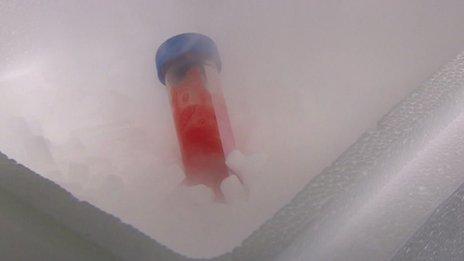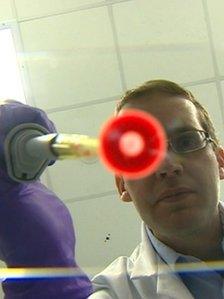A revolutionary new way to store blood for transfusions
- Published
- comments

Ice crystals in the blood thaw in such a way that they violently tear the blood cells apart
Storing blood is vital but actually quite tricky.
When you donate blood it can be kept refrigerated for up to 42 days until it passes its use-by date.
Unfortunately, because the amount of blood donated varies, so too does the supply available because it's not possible to store it for long periods of time. For some rarer blood groups we may sometimes only have five day's supply in the UK.
It would be much easier if we could freeze blood and keep it on ice indefinitely. Unfortunately blood doesn't respond well to being frozen.
It's not the actual freezing that's the problem, it's the thawing afterwards.
Wood glue
The ice crystals in the blood thaw in such a way that they violently tear the blood cells apart turning frozen blood into unusable pink mush.
Now, researchers at the University of Warwick think they have found a solution to this problem that will allow large scale freezing of donated blood for the first time.
After three years studying how blood freezes and thaws the scientists, led by Dr Matthew Gibson, realised they could change how the ice crystals behaved by adding a particular polymer to the blood before putting it in the freezer.

The research would be very useful for those with very rare blood groups
The polymer is called polyvinyl alcohol and is similar to polymers found in wood glue and children's paints.
We know plenty about it and it is considered very safe to use.
Only a small amount added to blood disrupts the behaviour of the thawing ice crystals and means the blood cells safely survive being thawed from frozen.
These are lab trials but the hope is if this approach was used on a much larger scale then you could be able to defrost bags of blood in hospitals in a fairly robust way, perhaps even just leaving them on out on the side for a few hours, and then hook them straight up to a patient for transfusion.
Large stockpile
The added polymer is so safe and is used in such small amounts it won't affect the health of the patient and so doesn't need to be removed before transfusion.
The NHS has expressed an interest and Dr Gibson and his fellow researcher Robert Deller say it is possible large scale trials of this idea could start in 12 to 18 month's time.
Initially, it would be very useful for people with very rare blood groups. It would allow them to donate and freeze their own blood, building up a large stockpile for potential use at a future date if needed.
But this approach might also help improve the freezing of bone marrow and allow easy freezing of platelets and even stem cells.
If you would like to read the paper about this research you can find it here, external.